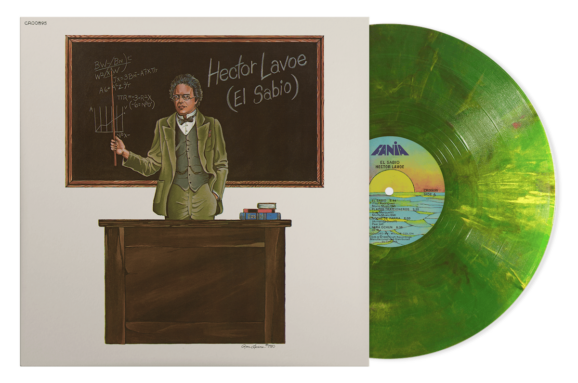By the time Héctor Lavoe released El Sabio in 1980, he had already established himself as salsa’s most captivating figure: a gifted vocalist with impeccable phrasing and charisma who brought vulnerability, humor, and fire to every performance. El Sabio may not be his most commercially celebrated album, but it stands as one of his most musically nuanced and emotionally layered records. El Sabio reunites Lavoe with producer Willie Colón and arranger José Febles, whose fingerprints are all over the album’s sharp, densely orchestrated sound. Now reissued for its 45th anniversary by Craft Latino on 180-gram vinyl for the first time, the album feels as vital as ever, an essential document from an artist at once at the peak of his powers and on the edge of personal unraveling.
The title track (which roughly means “wise teacher” or “sage”), written by mambo legend Tito Rodríguez, opens the record with flair and swagger. Lavoe, plays with the idea of wisdom as both insult and badge of honor, turning in a vocal performance that’s theatrical and combative. But El Sabio isn’t all posturing. Its emotional anchor lies in the aching “Plazos Traicioneros,” a bolero penned by Cuban composer Luis Marquetti and previously made famous by Vicentico Valdés. Lavoe’s take is deeply affecting, sung with a delicate fragility that strips away any pretense. His voice carries a quiet devastation, his phrasing intimate and slow-burning, proof of his skill not just as a salsero but as an interpreter of romantic sorrow. Another standout is “Lloré,” a tune built around a confessional narrative. Singing from the perspective of a man hiding heartache behind machismo, Lavoe delivers a performance that vacillates between brash and broken.
The album also contains some of Lavoe’s most experimental detours with two rare instrumental tracks. “Ceora,” an instrumental reinterpretation of Lee Morgan’s jazz ballad, trades swing for subtle rumba, and though Lavoe doesn’t sing on it, the band’s performance, particularly from pianist José Torres and the vibrant horn section, maintains the album’s emotional throughline. Similarly, “Para Ochún,” a mambo infused with Afro-Caribbean spiritual themes, offers a rich, percussive landscape that honors its Santería roots while staying grounded in salsa dura. “Noche de Farra,” a reworking of a Cuban cha-cha popularized by La Sonora Matancera, is another highlight, driven by a more percussive, urban approach. Lavoe injects the piece with a rustic edge that reflects his Puerto Rican upbringing while updating it with a distinctly New York attitude sounding more aggressive and more urgent.
Though only five of the album’s seven tracks feature Lavoe’s vocals, El Sabio never feels incomplete. The cohesion comes from tone and mood rather than uniformity. It’s a record that balances the dancefloor with introspection, confidence with collapse. For fans and collectors, the 45th-anniversary reissue is a fitting tribute. The remastered sound highlights the lush arrangements, crisp horn lines, and subtle piano work that often got buried in earlier pressings. And for those just discovering Lavoe, El Sabio is a striking introduction, not only to one of salsa’s greatest voices, but to a genre that pulses with humanity at every turn.









